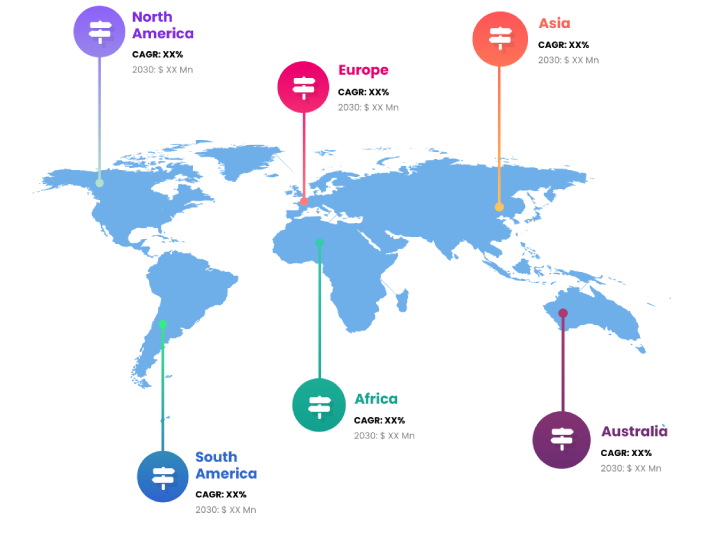
The term "meat substitute" refers to items derived from plants that mimic the texture and flavor of real meat. Compared to meat products, plant-based alternatives offer the main component to consumers in a more sustainable and eco-friendly manner. By mimicking the appearance, texture, and flavor of meat, plant-based and other non-animal products are rendered edible. Vegan meat primarily consists of soybeans, wheat berries, lentils, tempeh, tofu, yuba, and a variety of nuts.
The market is anticipated to be driven by the increasing demand for plant-based diets and the growing awareness of animal rights among consumers, as demonstrated by numerous welfare organizations. Beyond Meat and Impossible Foods were among the few that saw a decline in demand for their plant-based meat products in 2023, mostly because of the high prices. This was in spite of the fact that the plant-based meat industry as a whole was expanding.
As more and more individuals choose a vegetarian diet that excludes all animal products, plant-based meat is playing an increasingly important role in veganism. Some people choose vegetarian ingredients to avoid cruelty to animals and to support sustainable food and drink production, while others are becoming vegan for health and ethical reasons. The environmental effect and ethical issues linked to animal husbandry and meat production are driving people throughout the world to choose plant-based alternatives. This is expected to propel the plant-based meat market from 2024 to 2031.
The capacity of plant-based meat products to mimic those of animal-based meat is a key factor propelling the expansion of the plant-based meat market. Take, for example, how these goods imitate the look, smell, texture, and flavor of meat from animals. A study backed by the National Institutes of Health in the United States found that plant-based meat alternatives to ground beef are lower in saturated fat, more abundant in fiber, and a better source of iron and folate. The main ingredients of plant-based meat alternatives are coconut oil, beet juice, and vegetable protein extract. The growing number of vegetarians and flexitarians is expected to influence consumer tastes towards meat alternatives made of plants, which is expected to lead to increased popularity for the plant-based meat sector in the coming years.
On the other hand, plant-based meat alternatives may be lacking in protein, omega-3 fatty acids, and other elements found in animal meat. Vegan alternatives to meat might be devoid of nutrition due to excessive processing and chemicals. To give you an example, plant-based meat alternatives are laden with additives that make them taste, look, and feel just like real meat. Additionally, those with hypertension, diabetes, or any number of other health issues should avoid plant-based meats due to their incredibly high salt level. The scale of the plant-based meat market is expected to be affected by these factors in the coming years.
There is a wide variety of plant-based meats available now, and their popularity is only going to increase. In addition to plant-based beef, other plant-based meats such as chicken, pork, and shellfish are also seeing increasing demand. During the projected years of 2024–2031, the market for chilled plant-based meat is expected to maintain its exponential rise. In the plant-based business, it represents a change in product innovation and merchandising tactics.
Key input sources were interrupted, production areas were constrained, and product distribution was hampered during the COVID-19 outbreak, all of which caused substantial adjustments in the food supply chain. Adapting to these limitations, plant-based enterprises kept releasing new goods and increasing sales. Food supply chain interruptions occurred as a result of global trade restrictions imposed in reaction to COVID-19.
A number of factors have contributed to the meteoric rise of the plant-based meat industry, including the increasing prevalence of obesity and cardiovascular diseases (CVDs), the vegan movement's meteoric rise in popularity, and the involvement of innovative industry heavyweights like Unilever. Companies in the food business have seen a meteoric surge in sales of plant-based meat alternatives in recent years. This is mainly because these alternatives have less cholesterol, fewer saturated fats, and no antibiotics. For example, the PLANT BASED FOODS ASSOCIATION reports that in July 2020, sales of plant-based meat products climbed by 23% when these commodities were displayed at meat stores. An increasing number of industry heavyweights are making official forays into plant-based meat products, which may bode well for the sector overall.
Report Coverage
Global Plant Based Meat research report categorizes the market for global based on various segments and regions, forecasts revenue growth, and analyzes trends in each submarket. Global Plant Based Meat report analyses the key growth drivers, opportunities, and challenges influencing the global market. Recent market developments and Plant Based Meat competitive strategies such as expansion, product launch and development, partnership, merger, and acquisition have been included to draw the competitive landscape in the market. The report strategically identifies and profiles the key Plant Based Meat market players and analyses their core competencies in each global market sub-segments.
| REPORT ATTRIBUTES | DETAILS |
|---|---|
| Study Period | 2017-2031 |
| Base Year | 2024 |
| Forecast Period | 2024-2031 |
| Historical Period | 2017-2021 |
| Unit | Value (USD Billion) |
| Key Companies Profiled | Beyond Meat (U.S.), Impossible Foods Inc. (U.S.), Maple Leaf Foods (Canada), Unilever (Netherlands), Conagra Brands, Inc. (U.S.), Kellogg Co. (U.S.), Tofurky (U.S.), Valio Oy (Finland), Sunfed (New Zealand), VBites Foods Ltd (U.K), The Kraft Heinz Company (U.S.), Yves Veggie Cuisine (U.S.), Ojah B.V. (Netherlands), Moving Mountains Foods (U.S.), Eat Just, Inc. (U.S.), LIVEKINDLY Collective (Germany), Gooddot (India), No Evil Foods (U.S.) |
| Segments Covered | • By Product |
| Customization Scope | Free report customization (equivalent to up to 3 analyst working days) with purchase. Addition or alteration to country, regional & segment scope |
Key Points Covered in the Report
- Market Revenue of Plant Based Meat Market from 2021 to 2031.
- Market Forecast for Plant Based Meat Market from 2021 to 2031.
- Regional Market Share and Revenue from 2021 to 2031.
- Country Market share within region from 2021 to 2031.
- Key Type and Application Revenue and forecast.
- Company Market Share Analysis, Plant Based Meat competitive scenario, ranking, and detailed company
profiles. - Market driver, restraints, and detailed COVID-19 impact on Plant Based Meat
Market
Competitive Environment:
The research provides an accurate study of the major organisations and companies operating in the global Plant Based Meat market, along with a comparative evaluation based on their product portfolios, corporate summaries, geographic reach, business plans, Plant Based Meat market shares in specific segments, and SWOT analyses. A detailed analysis of the firms' recent news and developments, such as product development, inventions, joint ventures, partnerships, mergers and acquisitions, strategic alliances, and other activities, is also included in the study. This makes it possible to assess the level of market competition as a whole.
List of Major Market Participants
Beyond Meat (U.S.), Impossible Foods Inc. (U.S.), Maple Leaf Foods (Canada), Unilever (Netherlands), Conagra Brands, Inc. (U.S.), Kellogg Co. (U.S.), Tofurky (U.S.), Valio Oy (Finland), Sunfed (New Zealand), VBites Foods Ltd (U.K), The Kraft Heinz Company (U.S.), Yves Veggie Cuisine (U.S.), Ojah B.V. (Netherlands), Moving Mountains Foods (U.S.), Eat Just, Inc. (U.S.), LIVEKINDLY Collective (Germany), Gooddot (India), No Evil Foods (U.S.)
Primary Target Market
- Market Players of Plant Based Meat
- Investors
- End-users
- Government Authorities
- Consulting And Research Firm
- Venture capitalists
- Third-party knowledge providers
- Value-Added Resellers (VARs)
Market Segment:
This study forecasts global, regional, and country revenue from 2019 to 2031. INFINITIVE DATA EXPERT has segmented the global Plant Based Meat market based on the below-mentioned segments:
Global Plant Based Meat Market, By Product Type
Tofu
Tempeh
Seitan
Others
Global Plant Based Meat market, By Source
Soy
Pea
Wheat
Others
Global Plant Based Meat Market, By Distribution Channel
Indirect
Direct
Global Plant Based Meat market, Regional Analysis
- Europe: Germany, Uk, France, Italy, Spain, Russia, Rest of Europe
- The Asia Pacific: China,Japan,India,South Korea,Australia,Rest of Asia Pacific
- South America: Brazil, Argentina, Rest of South America
- Middle East & Africa: UAE, Saudi Arabia, Qatar, South Africa, Rest of Middle East & Africa
You will get in-depth and extensive plant based meat market market research and competitor analysis for your business to help you develop more profound insights into the plant based meat market Market.
Through INFINITIVE Data Expert is a professional Market Research services, I will identify the plant based meat market market size, demand & opportunities, growth rate, and target audience with a comprehensive analysis of your competitors.



